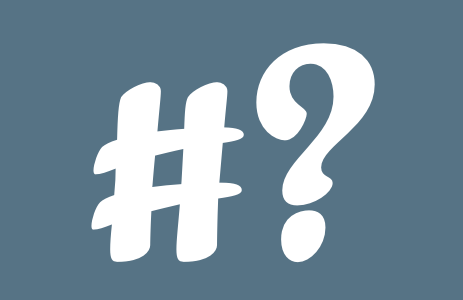A hashtag is a word or phrase along with the # character inserted into a tweet.
The point of hashtags is to make the message or tweet, easily found. By inserting a hashtag that has been become viral or popular or one suggested by an organisation, the tweeter can add their voice to a global conversation about an issue. An example could be:
I can’t believe how great the London 2012 Games have been. #olympics #london2012
When anyone on twitter searches for the hashtags #olympics or #london2012, this tweet will be amongst those that are found. The inclusion of hashtags also means that the tweet adds to the topics that are trending at the time.
The value of hashtags for companies engaged in social media marketing is two-fold.
The first value is the trackability of hashtags. If for example a brand called Run Shoes decided to run a competition on twitter where twitter users were encouraged to tweet about their favourite places to run in Run Shoes products, with the chance to win a place in the London marathon, one of the conditions would be the use of a hashtag. So the competition could be announced on twitter like this:
Tell us your favourite place to run in your @RunShoes to be in with the chance to win VLM place. Use #loveRunShoes to enter
A typical response from a user to that might be something like this:
Favourite place to run in @RunShoes is along cliffs overlooking the sea on the Cornish Coast. Perfect location, perfect shoes. #loveRunShoes
It would then be possible to track all the tweets using the hashtag #loveRunShoes and select a winner from everyone who tweets an answer to the competition including the hashtag.
The other value of hashtags is to create or benefit from trending subjects. An example of that is a hashtag that @simon_freeman tweeted after noticing a trend amongst runners for wearing shorts over their running tights. The first tweet that @simon_freeman posted was this:
#Shights in full effect at @RunDemCrew tonight… but, man, they make dem shights look so cool. Whacha gonna do, eh?
Within a matter of a few days, the hashtag had been re-used by dozens of others tweeters with tens of thousands of followers. Given that there was no motivation to share the hashtag except for being part of an in-joke, the reach* of the hashtag was immense.
An even more impressive example for a hashtag reaching epidemic levels, is the #DoctorWho hashtag. By 3.30pm on 2 September 2012 the hashtag had been used in over 165,000 tweets and with the average twitter user having 126 followers, that means the hashtag was potentially seen by 20,790,000 people (although that statistic is more than a little thin, I hope you see our point).
So for a brand or a company looking to use twitter as a social media marketing tool, a hashtag could be used to own a concept, for example #naturalrunning or #nomoreblisters or use a trending topic to create interest, an example for a brand or retailer supporting a cancer charity being #runtobeatcancer.
OK, this is the sales pitch (you knew this was coming, right?)
Having just described the process of creating and using hashtags and the potential benefits of them as part of a social media marketing campaign, you might be wondering what freestak can do to help.
Well the first and most obvious thing, is that we can help you come up with hashtags that will catch on and start to be used and shared.
We also have a range of tools that we can use to optimise a twitter campaign for you and ensure that data from your campaign is collected, incentives are distributed and followers are welcomed in a way that is consistent with your brand values. The list of possibilities is huge and we would be delighted to talk to you about what you are trying to achieve and which tools might best to do that.
* reach: now this is a challenging subject that we will undoubtedly return to time and again. We believe in the power of social media as an agent for sharing and influencing. But there are agencies out there who try to utilise traditional media marketing metrics to sell social media marketing. They use the sort of multipliers initially created for outdoor advertising or print media advertising, where the number of people passing a billboard site or the number of copies of a magazine distributed, were multiplied by some number or other to create a ‘reach’ for the magazine. In social media it is not that simple – which we believe is a good thing. But maybe the best way for us to explain what we think about this, is when we meet.

Leave a Comment